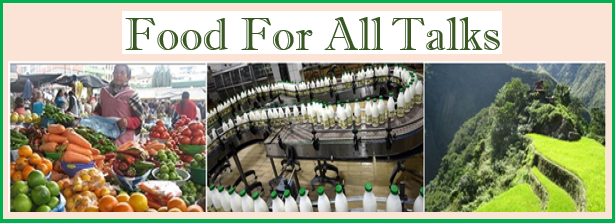
The World Bank Group’s Agriculture Global Practice is organizing a series of Food for All Talks under the WBG-Netherlands Partnership “Food for All”. In this sixth edition, Krijn Poppe, senior economist at Wageningen University & Research, will give a lecture on “Big opportunities for Big Data in Agri-Food Value Chains” The event takes place on Thursday March 29, 2018 (12:15 – 13:45 AM EST in Washington DC || 18:15 – 19:45 pm CET in the Netherlands) and can also be attended globally through WebEx (see below for details).
The World Bank’s efforts to reduce food loss and waste ask for reliable and accurate numbers to act upon. Field measurements are precise and give a good indication of where the losses happen, however, they are also costly. Perhaps Information Technology (IT) can come to the rescue. Farming and the food chain are experiencing a period of change with new information and communication technologies. Internet of Things, location based monitoring (by machinery, satellites or drones), mobile and cloud computing lead to a deluge of data. This makes big data analysis possible and leads to precision agriculture (or smart farming). Social media and block chain technology increase the role of data in the food chain up to the consumer, where data science supports developments into personalised nutrition. These technologies have a high potential for unprecedented innovations, comparable to the introduction of tractors and pesticides in the 1950s.
Farming and the food chain become more and more dependent on data. This all leads to the application of big data techniques, to support precision agriculture (or smart farming) and solve societal challenges like climate change, food security and public health. But it will also change the organisation of the food chain, as upstream and downstream industry get more insight in the performance of farmers and the behaviour of consumers.
Besides these questions of coordination and a critical assessment of developments, there are also issues of innovation. How to create successful innovation programs between different actors, including universities and governments? Which business models for data platforms or new services are successful? How can governments better collect data for public surveillance programs and the execution of agricultural policy? Or will block chain reduce the need for such governmental activities?
Food for All Talk
In his lecture “Big opportunities for Big Data in Agri-Food Value Chains” for the World Bank, Krijn Poppe discusses these trends and issues. He will share recent insights from Wageningen University & Research gained from Dutch and European projects.
The lecture is chaired by Juergen Voegele, Senior Director, Agriculture Global Practice and discussant is Holger Kray, Lead Agricultural Economist, Agriculture Global Practice.
How to join
Join Using WebEx: Meeting password: ynRgmq3Y; Meeting number: 730 265 145.
Join Using Phone: Toll: 1-650-479-3207; Access code: 730 265 145.
By Video Conference: , External IP: 192.86.102.202; followed by internal dial-in number 55792004.
Background information
Krijn Poppe (1955) works as senior economist at Wageningen University & Research, currently in a position as Research manager at Wageningen Economic Research. As part of the management team he is responsible for research strategy and high level policy advise.
He supports, on a scientific base, decision makers in policy and business to understand and act upon trends in agri & food and (co)manages various research programmes for the European Union on the European food industry, ICT and on research infrastructures for food and health and the farm accountancy data network (FADN). He has a broad overview of current topics and is much in demand as a speaker. He currently leads an expert group on Food2030 (DG RTD) that helps to design the European Commission’s research agenda for the 9th Framework Programme on research and innovation.
Food for All Talks
The Food for All Talks is a series initiated by the Food for All Partnership of the World Bank Group and the Netherlands. They deliver new insights on strategic issues and operational questions around agriculture and food value chains for the WBG. For more information, visit the Food for All webpage.
- This event has passed.

